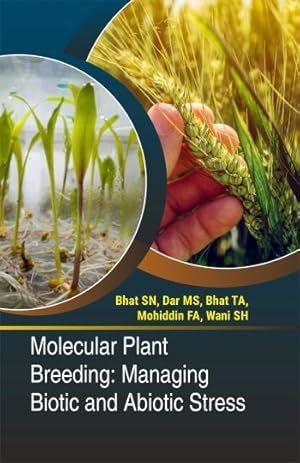Suhail Nazir Bhat Mohammad Saleem (2 results)
FeedbackSearch filters
Product Type
- All Product Types
- Books (2)
- Magazines & Periodicals (No further results match this refinement)
- Comics (No further results match this refinement)
- Sheet Music (No further results match this refinement)
- Art, Prints & Posters (No further results match this refinement)
- Photographs (No further results match this refinement)
- Maps (No further results match this refinement)
- Manuscripts & Paper Collectibles (No further results match this refinement)
Condition
- All Conditions
- New (2)
- Used (No further results match this refinement)
Binding
- All Bindings
- Hardcover (2)
- Softcover (No further results match this refinement)
Collectible Attributes
- First Edition (No further results match this refinement)
- Signed (No further results match this refinement)
- Dust Jacket (No further results match this refinement)
- Seller-Supplied Images (2)
- Not Print on Demand (2)
Free Shipping
- Free Shipping to United Kingdom (No further results match this refinement)
Seller Rating
-
Modern Farming Technologies for Vegetable Crop Production
Published by Agrobios (India), 2022
ISBN 10: 9394380000 ISBN 13: 9789394380004
Seller: Vedams eBooks (P) Ltd, New Delhi, India
Hardcover. Condition: New. Contents: 1. Evolution, Distribution and Cytogenetics. 2. Nursery Raising. 3. Cropping Systems. 4. Integrated Nutrient Management. 5. Integrated Pest Management. 6. Effect of Environmental Factors. 7. Manipulation of CO2, Light and Temperature for Vegetable Production. 8. Protected Seed Production. 9. Greenhouse Structures. 10. Soilless Culture. 11. Tilling as a Screening Tool. 12. Plant Ideotype Concept. 13. In-Vitro Conservation. 14. Somatic Hybridization. 15. Protoplast Culture and Fusion. 16. Seed Treatments and Seed Storage. 17. Seed Marketing, Demand Forecast and Marketing Organization. Over the past few decades, priority was given to achieve self-sufficiency in agricultural output. However, agricultural production has lagged far behind that of the services and manufacturing sectors in recent years, failing to keep pace with other economic sectors. Agriculture's share to GDP has declined sharply, despite continued reliance on the agricultural sector for subsistence. The Indian government has set a policy goal of doubling farmers' income by 2022. Farming expansion towards more remunerative enterprises, such as horticulture (fruits, vegetables, ornamentals etc.), cattle, and fish, was one of the key choices identified for raising farmers' earnings. Horticulture has a significant role to play in providing employment and income possibilities in India's north-western Himalayan states. Numerous geographical specificities that characterize the region create limits on increasing field crop output and providing revenue for smallholders. Vegetable crops such as Tomato, Brinjal, Potato, Chilly, Beet-root, Radish, Turnip, Carrot, Broccoli, Cabbage, Cauliflower, Knol Khol, Lettuce and many more have a lot of potential throughout the terrain. During the past decade tremendous advances have been achieved in various areas of crop improvement to achieve agricultural sustainability. In this regard, the present book has been brought out to highlight the recent progress achieved in vegetable cultivation methods with the advanced breeding and biotechnological interventions aiming sustainability in the production. This book delivers a convincing review accounting diverse aspects and progress towards the paradigm shift in vegetable growing. This book covers most of the syllabus topics for the M. Sc and Ph. D students studying in various agricultural institutes. The book provides comprehensive knowledge about the history of important vegetable crops and their evolution, distribution and cytogenetics, proper nursery raising techniques, different cropping systems, integrated nutrient and pest management, environmental effects affecting crops and their manipulation for vegetable production, vegetable seed production under protected cultivation, storage and treatments of seeds, various greenhouse structures, soilless vegetable growing, using biotechnological tools like "TILLING" for screening purposes and plant ideotyping, in-vitro conservation, somatic hybridization and protoplast culture and fusion technique.
-
Molecular Plant Breeding: Managing Biotic and Abiotic Stress
Published by Agrobios (India), 2023
ISBN 10: 9394380299 ISBN 13: 9789394380295
Seller: Vedams eBooks (P) Ltd, New Delhi, India
Hardcover. Condition: New. The book entitled 'Molecular Plant Breeding: Managing Biotic and Abiotic Stress' provides state-of-the-art developments on various facets leading to improved agricultural production and productivity. Field crops make a significant contribution in overall agricultural production and figure as an integral component in the nation's economy. Cereals are budding as an important sector at the present time. Cereal grain production provides a promising economic opportunity for plummeting rural poverty and unemployment in developing countries. The present and the future need is considerable augmentation in production, improved nutritional quality and resilience to biotic and abiotic stresses in the face of changing climatic scenarios. Hence there is need to formulate strategy regarding improvement in crop production. This book provides the advances regarding enhanced production and quality of field crops through genetic improvements and other innovative interventions, plant resistance and defence mechanism, genetics, chemical composition, hormone signaling, phytoalexins in plants, physiology of seed maturation and various aspects regarding breeding of cereal crops. With the recent advances in molecular biology tools there has been a tremendous advance in the application of the technologies to crop improvement. This book is intended to have professional text to cover some part of the courses offered at post-graduation levels by various agricultural universities as well. We intently feel that this book will be extremely useful for students, especially those who explore breeding of field crops at molecular level, research scholars and scientists working in the area of sustainable agriculture development at Universities, Research institutes, R&Ds of Agricultural MNC's for conducting research and various Funding Agencies for planning future strategies.



